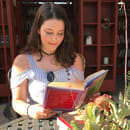I couldn’t have been more than six or seven years old when I first noticed how romance-obsessed our culture is. I remember driving in the car with my mom, listening to the songs playing on the radio and realizing that all of them were, in some way or another, about romantic love.
I then started to notice this obsession everywhere. Two of my best friends growing up were boys, and I lost track of how many times someone made jokes about us secretly dating. I was still in elementary school when my family started to obsess over my male crushes, and it often felt that, as a girl, boys were supposed to be the most interesting thing to me. While I happily joined in on crush culture with my friends, I couldn’t help but notice how having a significant other seemed to take so much precedence in everyone’s lives.
I only noticed this more as I got older. I always somewhat dreaded going to family gatherings while single as I knew the boyfriend question would come up at some point. It felt like a huge slap in the face to list off all of my accomplishments, interests, and passions to slightly disinterested extended family members, only to watch them become noticeably more invested when someone brought up my relationship status. Regardless of what I achieved or felt proud of myself for, none of that was nearly as interesting to anyone as whether or not I had a man beside me.

Don’t get me wrong, romantic love is a beautiful thing, and there is nothing wrong with seeking out or desiring these types of relationships. Having a partner, going on dates, and everything associated with romantic love can be an amazing experience, and I’m definitely not opposed to any of it. I just can’t help but wonder how much of our desire to be in these relationships is because we’re being told that they’re extremely important, and not because it’s something we actually want for ourselves.
Since this is something I’ve been interested in for a while, I knew that I wanted to read Loveless by Alice Oseman as soon as I heard about it. Loveless follows Georgia, an 18 year old going into her first year of university who has no romantic experience whatsoever– she’s never dated anyone, never had her first kiss, and has never even had a “real” crush on anyone, male or female. Throughout the course of the book, Georgia slowly realizes that she identifies as asexual/aromantic, and struggles to accept this identity before finally deciding that there’s nothing “wrong” with her just because she doesn’t value or desire romantic relationships in the same way that most people do.
While I don’t identify with Georgia’s sexual orientation, I did empathize with the main theme of the book, which centers around the idea of other types of love being equally as powerful as romantic love. In her pursuit of romance, and in the struggle to accept her identity, Georgia pushes aside the important relationships she already has with her family and friends and ends up hurting both herself and other people in the process.
While romantic love can be amazing and beautiful, our obsession with it can sometimes lead to negative outcomes, which I have seen in my own life. I’ve drifted away from my male childhood friends because the teasing about our relationship status got to be too awkward as we grew up. Many of us can relate to feeling like a friend doesn’t have time for us anymore after getting into a relationship, and how often do we beat ourselves up for being single, convinced we’re unlovable because of our relationship status?
As someone who has definitely both sought out and desired romance, this book made me consider whether a person who not in a relationship has to be considered “Loveless.” While it probably sounds cheesy, I do think that other types of love can be just as important and fulfilling as having a romantic partner can be. While relationships are fun, we should take a step back sometimes and be thankful for some of the other ways we can experience love.
Georgia’s cousin, who identifies in the same way, explains this idea after Georgia asks her if she’s lonely or not without a partner: “Friendships can be just as intense, beautiful and endless as romance. There’s love everywhere around me – there’s love for my friends, there’s love in my paintings, there’s love for myself. There’s even love for my parents, somewhere in there. I have a lot more love than some people in the world ever will. Even if I’ll never have a wedding.”



